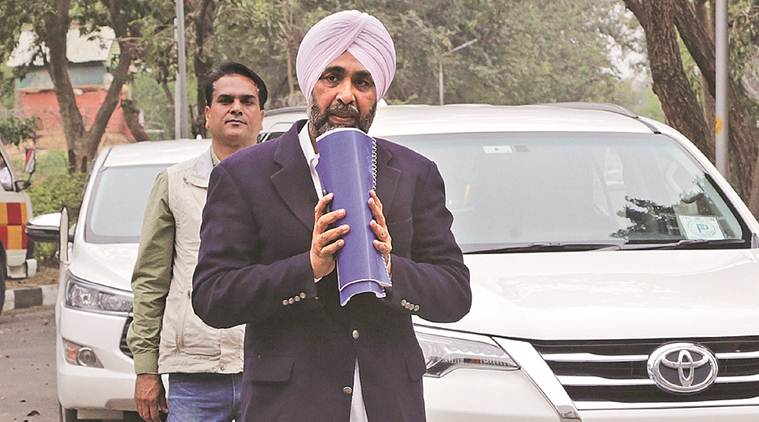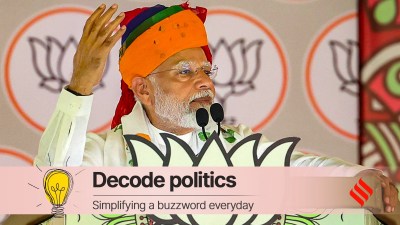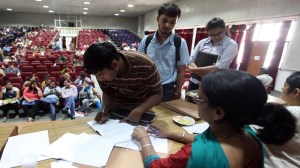- India
- International
Express interview: ‘Focus on agriculture helping Punjab tide over the fiscal crisis’ says Punjab FM
"The estimated revenue loss this year would be Rs 22,000 crores. We had planned to net Rs 88,000 crores this fiscal, but the estimates will have to be revised to around Rs 66,000 crores".
 Punjab’s Finance Minister Manpreet Singh Badal. (File)
Punjab’s Finance Minister Manpreet Singh Badal. (File)
At a time when Punjab’s revenues have been severely hit due to the pandemic outbreak, the man at the helm of managing its fiscal health, Finance Minister Manpreet Singh Badal, tells RAAKHI JAGGA that his strategy to get the state back on track is not being formulated by sitting in the secretariat and listening to officials, but by taking direct feedback from people on the ground.
You have been visiting markets and meeting people, what is your assessment of business sentiment on the ground?
The past three months have been the saddest period I have seen in my life. Not just my personal life, but also the life of hundreds of millions of people. When lockdown relaxations were announced, and markets started reopening, I ventured out and started meeting people on my own. The market sentiment was among the lowest ever that we have witnessed with the recessionary sentiment arriving along with the pandemic.
What are you doing to change this sentiment?
I had said this earlier that the battle against Covid-19 will not be fought from Delhi or Chandigarh. It would be fought in the trenches. It would be fought in every locality and every community. As Finance Minister, I could be sitting in the secretariat clearing files and listening to officialdom. But instead of obtaining second-hand feedback, my focus has been to obtain feedback on a one-to-one basis. Market after market, shop after shop, meeting people from different professions. This has helped in three major ways — a clearer picture is emerging regarding the immediate issues that people are facing. We also know about the effectiveness and impact of governmental interventions in helping people. Secondly, it has helped assure the public that the government is reaching out to them in their homes, in their shops, and their offices. No home, no family, no one should feel that the government is not there to help them. In times of crisis, people should not be trying to reach out to the public officials, rather public officials should be reaching out to people to aid and assist.
How much revenue loss did Punjab suffer in March, April, and May compared to last year?

A rough estimate would be Rs 6000 crores. The estimated revenue loss this year would be Rs 22,000 crores. We had planned to net Rs 88,000 crores this fiscal, but the estimates will have to be revised to around Rs 66,000 crores. There has been a daily loss of Rs 150 crores on account of VAT, GST, and stamp duty, coupled with a daily shortfall of Rs 30 crores in power consumption.
How is the state going to come out of this situation?
We moved in very quickly in March-April. Anticipating a serious financial crunch, we channelised all our efforts towards foodgrain procurement. We reasoned that if we can procure wheat without a hiccup, then a sum of nearly Rs 26,000 crores would be injected into the economy right away. Much of this will go directly to the farmers, farm labour, and all those associated in the procurement chain. Despite the pandemic, the state pulled it off. We more than doubled the number of mandis, and we extended the duration of procurement from 22 days to 45 days. This aggressive intervention is now making an impact, and we hope to see a commensurate spending increase in the coming weeks. Secondly, the efforts were not restricted to wheat alone. Potato and kinnow added another Rs 5,000 crores in the market.
These efforts are paying off. Already, there has been a study that points out that Punjab is one of the five states that is leading the economic turnaround. Punjab is blessed that way. While industry can be temporarily shuttered, and offices move to homes; crops cannot. Once sown, they grow and though they require constant care and nurturing, they are ready for harvest by the end of the season. So the focus on agriculture is what is helping Punjab come out of the crisis.
Your government spent over Rs 26 crore to send migrants back. Why was this money not used in compensating their wages, rentals to make they stay back?
In this century, it is undoubtedly India’s biggest humanitarian crisis, and in terms of history of Independent India, perhaps next only to the 1947 Partition. The state cannot just sit around and ignore this. Governments have to listen to people. They have to intervene.
In this case, there was a clamour among people to return home — be it Punjabis outside of Punjab, or be it those who wanted to leave Punjab to return to their homes. Whenever a crisis hits, the first tendency of people is often to return home. It would have been extremely unfair if while special flights were being arranged to charter NRIs, those with limited means were left behind.
Secondly, we worked with not just people wanting to return, but also industrialists and employers. While government announced a slew of measures to facilitate their movement, many migrants also backed out. They felt reassured that the government was there to help them.
Today, we are also hearing from people who have left that they will quickly want to return as soon as economic activity resumes in their respective sectors. People who have left Punjab are anxious to return.
Thirdly, the state did not just spend on ensuring their safe return home. Substantial efforts and resources went into ensuring free meals to everyone in the state. One can confidently state that barring a mistake here or there, no one went hungry in Punjab. Punjabis do not discriminate and the state received tremendous support from the voluntary sector as well as social and religious organisations to feed those without work or money. I think every village in Punjab organised langars.
There are mass layoffs and pay cuts in the private sector. What is the state government’s responsibility for its residents working in the private sector facing this hardship?
The state government is responsible for the welfare of every resident, be it in the public sector or the private sector or the unorganised sector. The immediate agenda is to kickstart the economy, and this will ensure that job losses are prevented. It is a macro-level issue, and it requires policy-level interventions.
Government is also providing the stimulus to mitigate the effects of the downturn. Also, we are also working towards stimulating new and emerging sectors as well as sectors that are in demand due to the pandemic — health care is one such example. Punjab sees a huge potential in health and wellness as new opportunities are emerging in this sector.
How has the Finance Department trimmed expenses of various departments? Any pay cuts or reduction in contractual staff?
First, capital expenditure is being restricted, since the state can no longer afford to spend money in case it is not supported by revenue receipts. Second, all departments have been directed to adhere to a new set of cost-cutting measures. There is a reduction in expenditures and entitlements of various employees. Thirdly, Punjab government is not planning any pay cuts. Contractual staff is largely dependent on the individual departments, and there is no policy-level decision by the Finance Department.
What is your outlook for the state’s economy in months to come?
We hope to be one of the first states in India to bounce back. Agriculture is already providing the bedrock. Dr Manmohan Singh has gracefully consented to provide overall guidance to Punjab. We are also hoping to receive the recommendations of the Group of Experts led by Montek Singh Ahluwalia, for the revival of the economy.
Where does Punjab stand in Covid as well as revenue management compared to rest of the country?
Though these are early days, Punjab has had reasonable success in terms of Covid management. Our fears were based on the influx of Punjabis stranded outside since many of them were stuck in Covid hotspots.
Punjab Chief Minister Capt Amarinder Singh was among the first to announce Covid prevention measures, be it the lockdown or curfew. Our medics and paramedics rose to the occasion. So did the people of Punjab. Awareness levels in Punjab are fairly high, and people largely adhered to restrictions and recommendations. First-hand accounts from Punjabis based in Italy and other countries who informed their families and villages back home about the drastic impacts of Covid-19 helped raise our awareness levels. Punjab is not among the top Covid-affected states, and God has been kind.
In terms of revenue management, let me share one simple fact. In the first few days of April, the state did not earn a single rupee in terms of taxes from either petrol or liquor or stamp duty and so on. Imagine this. A population of nearly 2.8 crores, and no receipts from major revenue streams. This was how bad things were in early April. I am sure things will look up in the coming weeks.
Punjab had levied a professional tax in April 2018 which was Rs 200 a month. It is being deducted from the salaries of people. What is the total professional tax collection till now and why are professionals who are losing jobs not being helped with this fund?
This tax is levied in over 20 states in India, and in other states (like Kerala for instance), this goes up to Rs 1,250 per month. It is also exempt from Income Tax. This tax is only paid by those who are gainfully employed and it is not imposed on others.
Professionals are a highly valued category, and no state can flourish without its fair share of professionals. The downturn is affecting everyone including professionals, and besides Covid-19, many professions are witnessing a shift and new professions are emerging. It is still early to hazard a guess, but AI, automation, digitisation are mega trends that may flourish at the expense of others. The future of work is changing, and certain professions are more vulnerable which implies that there will be professional deployments that require re-skilling. As one opportunity closes, many others emerge. The Punjabi ethos of being the first among the early adaptors applies to professionals as well.
The state is committed to helping out its residents and this cuts across all sectors, specially professionals. I can assure you that in the coming weeks we will announce positive state inventions in terms of cash incentives, ease of conducting business, skill upgrade, and an economic working environment where everyone, including professionals, can flourish.
Apr 23: Latest News
- 01
- 02
- 03
- 04
- 05






































